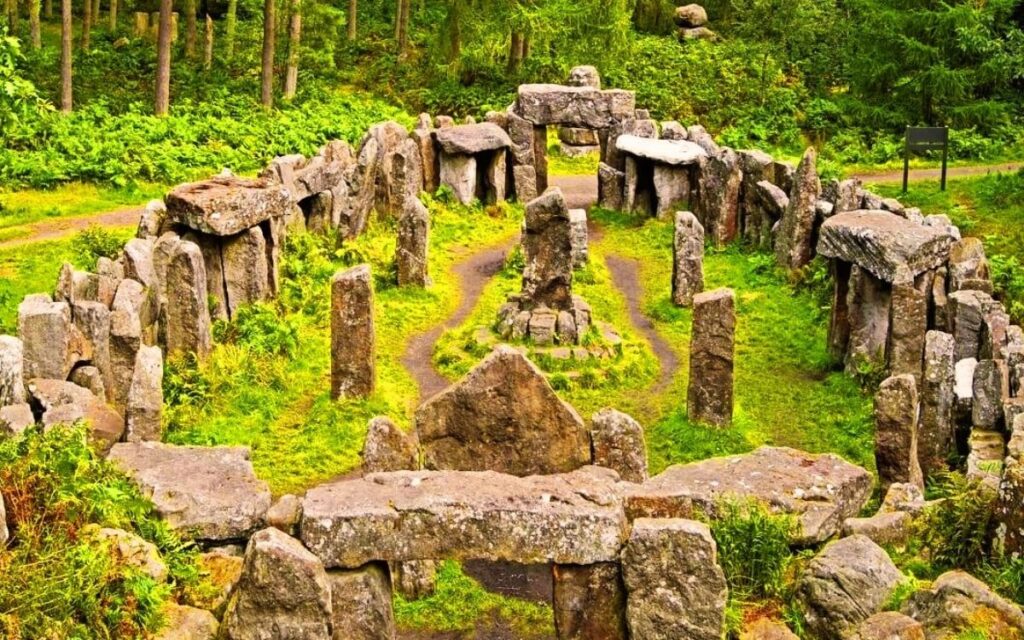The Druid’s Temple is a fascinating 19th century built folly near Ilton in North Yorkshire, which reveals our remote, forgotten past…

Though we know relatively little about the actual Druids who once oversaw Celtic society in the ancient past, the idea of these people lives very vividly within our cultural imagination. Most people would have some idea of what a Druid was, even if they couldn’t tell you where or when they lived.
All that we know of Druids comes to us from Roman historians. They themselves left nothing behind, of who they were, how they lived, or what they believed, except in scattered archaeological findings. It’s not surprising, then, that their identity has been so profoundly mythologised over the centuries since they vanished from the world.
This isn’t a recent phenomenon, either. At least far back as the 19th Century, the spectre of this mysterious, ancient priestly class has haunted our collective memory.
What is The Druid’s Temple?
This brings us to what has become known simply as The Druid’s Temple, in north Yorkshire. To look at it, you would not think twice but assume it was a genuine, bronze or iron age place of worship.
The influence of Stonehenge is instantly recognisable. In fact, William Danby of the Swinton Estate, close to the town of Ilton, conceived the monument as a replica of Stonehenge. He paid locals to build it during an economic downturn merely as a way of providing work, but he also attempted to pay a live-in hermit to remain there for seven years. His motivations weren’t purely charitable, I don’t think.
This fact, of the paying of the live-in hermit, is very telling in Danby’s motivations. Since as early as the 15th Century, people in the British Isles had begun to find a certain nationalistic pride in evoking their Celtic roots. Revered heroes, traditions and languages were all consciously brought back to the surface, to reclaim a lost identity. So, as I said, the project certainly was an altruistic way of revitalising the local economy.
However, it clearly meant more to him than this. He offered to pay a salary to a hermit who could successfully live, in full isolation, within the temple for seven years. No one ever managed the feat — one man came close, only leaving after five years. But, to Danby, it clearly was more than just busywork. It was about realising some kind of national fantasy.
In any case, the Druid’s Temple is a beautiful example of a folly of which there are several from this period. It consists of two large, stone rings in a grass field, with a stone plinth or altar in the centre. It is surrounded by forest and grass, and sits, to this day, on the private estate of the descendants of William Danby. Though it’s not clear precisely when it was built, it may have been as early as 1800, but it was certainly there by 1820 at the latest.
Paranormal connected to Druid’s Temple folly
Despite its anachronism, there has been no shortage of rumours of paranormal occurrences near or within its limits. Campers have been known to set up there overnight and reported sightings of disembodied shadows shifting across its surfaces. Strange, eerie noises have been reported at all hours of the day.
Without doubt the most significant and well-known occurrence at the temple was the alleged presence of a pig’s head upon the altar, around the year 2000. According to the two friends, they passed the temple in the early morning, where they saw the grisly tableau. Rumours got around until it ended up a point of discussion in the House of Lords. The Baroness Masham, of the nearby town of Ilton, argued that public access to the monument should be restricted, due to fears of Satan worship.
No significant evidence has ever been put forward for the idea of any kind of devil worship taking place at the Druid’s Temple. Baroness Masham’s urging of this kind of caution amounted to little more than the same kind of ‘Satanic Panic’ which gripped the cultural imagination in the previous decades. Still, even today, there are those for whom these kinds of monuments, even follies such as this one, are encircled by evil due to their pagan associations.
Beyond that, there have been numerous cases of all-night campers witnessing ghostly events. The Baroness herself stated that, one morning as she left early, she found a group of students that had travelled up from Leeds. They were shaken, cold and frightened. After only a few short hours, they had fled the temple in fear of shadows of the night and noises of the country. Places like the Druid’s Temple hold great power in our imagination, so this kind of result is not unexpected. They had a terrible experience that night, they said.
Another, larger incident occurred at the temple one night when a large group coming up from Manchester intended to turn the site into a night-long party. They caused a huge disturbance in the area, and were eventually moved on by the police, not spirits. Nonetheless, you again get the sense of the place this site has in the cultural imagination.
Fascination with our distant past
Anything we might suggest about what Druids did in actual temples would be a guess—indeed, most things we say about Druids are essentially informed guesswork. In most cases, we just have to work out which part of the Roman histories we believe. However, this notion of any association between Druids and Stonehenge was another anachronism of the 19th Century, and in fact, Stonehenge most likely far predates the Druid class in Europe.
So, ultimately, this temple reflects one thing: our ultimate fascination with our own distant past. The further back in time you go, the less clear the records become in this country. Danby, at least 200 years ago, tapped into this same fascination, just on a grander, you might say even more eccentric, scale. Though we do not know who they really were, monuments like this one allow us to imagine how those mysterious people lived in the remote, forgotten past.
Tell us your thoughts about this article in the comments section below!







